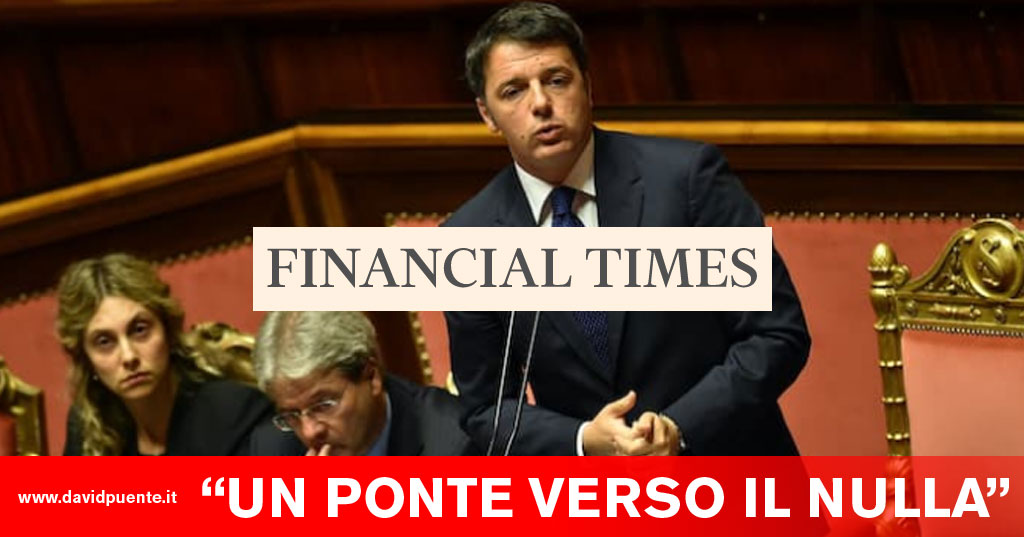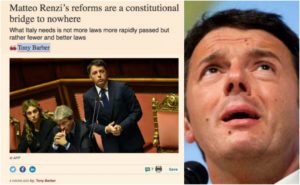Ieri ho ricevuto una richiesta via messaggio privato in pagina:
Possibile che abbiano fatto questo articolo? Lo trovo come commento sulla pagina DiMartedì, da parte di un utente. Mi basta anche un solo si o no. Grazie
L’articolo che mi è stato segnalato è quello del sito Freenewsonline.it dal titolo “Il Financial Times si schiera contro il referendum di Renzi“:
IL ”FINANCIAL TIMES” SI SCHIERA CONTRO IL REFERENDUM DI RENZI: ”LE SUE RIFORME SONO UN PONTE VERSO IL NULLA. MEGLIO BOCCIARLE, L’ITALIA RISCHIA DI PIÙ IN CASO DI VITTORIA DEL ‘SÌ”’
Si addensano nubi nerissime sul governo Renzi: sul sito del ”Financial Times” è apparso un duro editoriale di Tony Barber sul ”ponte verso il nulla” che sono le riforme costituzionali. L’editorialista, per bocciare il ddl Boschi, usa l’artificio retorico di associarle al Ponte Sullo Stretto, che Renzi ha recuperato dal cassetto dei sogni berlusconiani dopo averlo bollato ”uno spreco di denaro”.
Secondo Barber, ricicciare il ponte è un modo per ”ridurre l’incentivo dei fedelissimi di Berlusconi a farlo cadere in caso di sconfitta al referendum. Ma vale la pena un simile progetto?”. E da qui parte un micidiale attacco alle riforme costituzionali , ”che poco faranno per migliorare la qualità del governo, della legislazione e della politica. I poteri del Senato, la Camera alta del Parlamento, sarebbero drasticamente ridotti in favore della camera bassa. Il Senato non sarebbe più eletto con il voto popolare diretto, ma sarebbe composto principalmente da consiglieri e sindaci regionali. I suoi membri verrebbero tagliati da 315 a 100. (…) l’Italia non ha bisogno di più leggi approvate più in fretta, ma meno leggi e scritte meglio”.
L’articolo si chiude con una stroncatura definitiva, e dunque a un palese sostegno per il “No”: ”Nelle capitali europee, il sentimento comune è di sostenere Renzi. Un’Italia senza timone, vulnerabile a una crisi bancaria e al movimento anti-establishment dei Cinque Stelle, porterebbe problemi seri. Eppure, una sconfitta di Renzi al referendum non per forza destabilizzerà l’Italia. Una vittoria, invece, potrebbe far emergere la follia di mettere gli obiettivi tattici della sopravvivenza di Renzi davanti al vero bisogno strategico che ha l’Italia, quello di una sana democrazia”.
Il verdetto pare chiaro: il ”Financial Times” si schiera contro Renzi e il referendum.
Ecco l’articolo del Financial Times del 4 ottobre 2016 dal titolo “Matteo Renzi’s reforms are a constitutional bridge to nowhere” (link alternativo):
What Italy needs is not more laws more rapidly passed but rather fewer and better laws
Matteo Renzi, Italy’s prime minister, raised eyebrows last week when he suggested reviving a project to link the mainland with Sicily by building the world’s longest suspension bridge across the Strait of Messina. This multibillion-euro project is associated with Silvio Berlusconi, who promoted it during his several spells as prime minister between 1994 and 2011. The plan was dropped in 2013 on account of its cost, the strait’s vulnerability to earthquakes and the danger that mafia clans would fatten themselves on construction contracts.
Why does Mr Renzi, who criticised the bridge in 2012 as a waste of money, claim now to see its merits? One answer lies in the risks to his premiership from a referendum on constitutional reforms to be held on December 4. By hinting at the relaunch of a project dear to Mr Berlusconi’s heart, the centre-left Mr Renzi aims to reduce the incentive of Berlusconi loyalists and other centre-right forces to topple him in the event that he should lose the referendum.
Whether it makes sense to build a bridge above the waves where, 3,000 years ago, Homer imagined the monsters Scylla and Charybdis attacking Odysseus is a matter for debate. The larger point is that, contrary to Mr Renzi’s assertions, the proposed constitutional reforms would do little to improve the quality of government, lawmaking and politics. The powers of the Senate, the upper house of parliament, would be drastically curtailed in favour of the lower house. The Senate would no longer be elected by direct, popular vote but would consist mainly of regional councillors and mayors. Its membership would be cut from 315 to 100.
Mr Renzi contends that the system of government set out in Italy’s 1948 constitution is a dog’s breakfast that generates recurrent instability. At present, parliament’s two chambers have identical powers. No bill becomes law until they agree on a common text. According to the premier, this results in pointless delays that hobble well-intentioned governments, such as his own, that want to pass modernising reforms. Yet the record of postwar governments, including Mr Renzi’s, disproves his argument. Italian parliaments pass more laws year by year than those in France, Germany, the UK and the US. Despite lacking a Senate majority, Mr Renzi’s Democratic party has passed tax cuts and a labour market reform that are centrepieces of his programme.
Neither are the Senate’s powers the reason there have been more than 60 governments in the past 70 years. The chief explanation is the fragmented nature of Italy’s political parties. This reflects the fragmentation of Italian society. Every party, and each faction of every party, stands for a distinctive set of economic, geographical, ideological, religious or social interests — or even for the self-interest of its leader, as when Mr Berlusconi’s Forza Italia ruled Italy.
Pace Mr Renzi what Italy needs is not more laws more rapidly passed, but fewer and better laws. They must be written with care, and actually enforced, rather than blocked or circumvented by Italy’s public administration, special interests and the public. The reforms are bound up with an electoral law that will award bonus lower house seats to the winning party, handing it a majority for a five-year term. Cooked up in 2014 by Mr Renzi and Mr Berlusconi, this is a thoroughly bad reform, too.
In EU capitals, there is a feeling that Mr Renzi deserves support. A rudderless Italy, vulnerable to a banking crisis and to the anti-establishment Five Star Movement, would spell trouble. Yet a referendum defeat for Mr Renzi need not destabilise Italy. A victory, on the other hand, might expose the folly of putting the tactical objective of Mr Renzi’s survival ahead of the strategic need for a healthy democracy in Italy.
Si, per l’editoriale di Tony Barber le riforme di Renzi sono “un ponte verso il nulla“, citando come metafora il ponte sullo Stretto di Messina. Non solo, per Baber “le riforme costituzionali faranno ben poco per migliorare la qualità del governo, della legislazione e della politica“.




